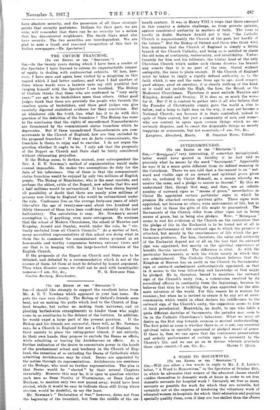[To ant Eerros or Mt " SPLerrere."1 ilia, - 1 should like
strongly to support the excellent letter from Mr. A. E. T. Newinan which appeared in your last issue. He puts the case very clearly. The Bishop of Oxford's friends seem bent, not on making the paths which lead to the Church of Eng- land broader, but rather on making them narrower, and on planting barbed-wire entanglements to hinder those who might come in as auxiliaries to the defence of the fortress. In addition,
he would expel a large part of the present garrison. If the Bishop and his friends are successful, there will, as Mr. Newman says, be a Church in England but not a Church of England. In their anxiety to place the voting-power almost, if not entirely, in their own hands, they propose to exclude the Deans ex officio, while admitting or leaving the Archdeacons ex officio. As a further indication of the desire to concentrate power in the hands of the predominant school and tendency in the Church of Eng- land, the intention of so excluding the Deans of Cathedrals while admitting Archdeacons may be cited. Deans are appointed by the nation through, its representatives. Archdeacons are nominees of the Bishops, who need no further representation. The plea is that Deans would be "elected" by their several Chapters invariably. However this may be, it is open to question whether such men as Dean Stanley of Westminster, or Dean Lake of Durham, to mention only two now passed away, would have been elected, while it would be easy to indicate those still living whose election would be doubtful, to say the least.
Mr. Newman's " Declaration of war," however, dates not from the beginning of the twentieth, but from the middle of the six-
teenth century. It was in Henry FIII.'s reign that there emerged in this country a definite challenge, as from private opinion,. against constituted authority in matters of faith. The issue is hardly in doubt. Matthew Arnold put it that "the Catholic Church is unquestionably the Church of the past, but hardly of the future." But the Bishop of Oxford and those who think with him maintain that the Church of England is simply a living branch of the Church Catholic, and being so is entitled to claim the old notes of continuity, universality, and infallibility. Unfor- tunately for him and his followers. the titular head of the only Christian Church which makes such claims disowns his branch and asserts that it is no part of the tree. Stated without ambiguity, the issue is plain enough. If the Church of England must be taken to imply a rigidly defined authority as to the faith which is one and the same from age to age, quod semper, quod ubique, quod ab omnibus, it is clearly nothing of the kind. or it could not include the High, the Low, the Broad, or the Modernist Churchman. Therefore it most exclude Maurice and Kingsley, Arnold and Stanley. If it does so, so much the worse for it. But if it is content to gather into it all who believe that the Founder of Christianity simply gave the world a clue to follow, and a lamp to light men on the way, it may yet become a National Church; not because it is State controlled, indeed in spite of State control, but just a community of men and come, who are content to agree upon certain things which no one seriously disputes, and to count the disputable things as merely trappings or ornaments, but not essentials.—I am, Sir,














































 Previous page
Previous page